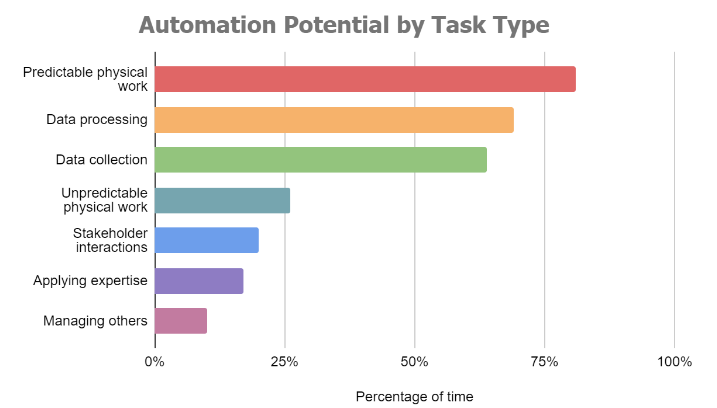Artificial Intelligence & Humans in Work
The day the robots take over has been a fear deep in our collective consciousness, from movies like the Terminator and the Matrix. There is a perfectly valid reason for it. The thought of being displaced from new technology is scary, especially when we don’t understand its full capabilities.
What Does The Future Hold For Jobs & Skill Requirements?
From science fiction to vocalised concerns with new technological advancements, no one wants to be left behind by the new technological changes in the workforce. However, it’s not all doom and gloom regarding automation, as some sci-fi movies or futurologists suggest.
AI, machine learning and automation will not replace the workforce but act as an optimiser to make work easier and create room for different roles. Some roles will disappear, others will change alongside these new technologies, and new ones will also emerge.
Similar to the industrial revolution, there was a great reshuffling as workers found themselves in new roles or began performing the same roles with new machinery. According to the World Economic Forum, an estimated 1 billion people will need to reskill by 2030 to meet the new future job requirements. For this reason, there is now an emerging trend among recruiters and hiring managers to really take skills into account when hiring. It’s not just about what you’ve studied or what degree you have, as much as if your current skills can translate into the next role.
If you want to get ahead of these emerging technological trends in work, the best thing you can do is start preparing for future skill requirements now.
Future Skill Requirements
Interpersonal skills, digital skills and decision-making in unpredictable situations will be the top skills in demand at the peak of the AI revolution.
Future Skills in Demand
- Cognitive flexibility & agility
- Managing people
- Adaptability
- Problem-solving
- Digital literacy and computational thinking
- Judgement and decision making
- Emotional intelligence
- Social intelligence
- Strategic planning
- Creativity
- Innovation
- Maths
Soft Skills
‘Human’ skills like empathy, self-awareness, compassion, relatability, communication and situational awareness are skills that machines and AI can’t get right for the most part. Machine learning AIs are cold and unfeeling, while people are able to bring companionship and add to the experience of living life.
Decision makers will still be largely needed in a world of automation and AI to guide the machinery and other workers to get the best outcome from changing situations and environments.
Digital Skills
On top of the soft skills, the new world of work will also require those with digital skills to be able to work with the new automation or refine and perfect it. One of the largest reasons, besides upfront costs, that we don’t use more robots or automation that scientists have been working on in our lives is the disruption of adopting these technologies into the workplace.
Good technological design should integrate easily into our lives ..
I’d like to see successful robotics, warehousing is great to watch and should be a short video, please.
Technology grows with demand ; as businesses and industries expect more of AI, machine learning and automation, the more technological jobs will boom to meet this expected demand. So before machine learning can really get to the point where it makes our lives and work easier, a substantial amount of work needs to happen on the back end. This opens doors for a wide range of technical roles.
Jobs Lost, Gained & Changed
Automation is growing at an accelerated pace, even faster than the changes that came from electricity or coal-powered fuel. Those who face the least disruption will be workers who prepare and are well placed to adapt, which is why it is very beneficial to understand what the job market will look like in the future.
According to a report by McKinsey Global Institute, there will be a drop in demand for these skills as automation rises.
Jobs that will decrease in the job market
Automation holds the most potential to be of use when predictable scenarios and outcomes are concerned. Therefore any role or set of responsibilities within a job that requires predictable physical activities holds much automation potential.
These are some roles that automation may either take on in future or play a part –
- Lower-level roles in manufacturing
- Lower-level roles in agriculture
- Filing clerk
- Assembly line workers
- Operating simple machinery
- Preparing fast food
- Data entry
- Roles focussed on collecting and processing data
Please note that while automation may take over some tasks in a job, it doesn’t necessarily mean a decline in occupations. Workers may simply redirect their focus on other, more valuable parts of a job. Such as decision making, refining the quality of work or innovation.
In the case of manufacturing, for example, more automation in the US has also led to business growth in some cases, which has produced more high-skilled, high-paying jobs.
Jobs that will increase in the job market
While there is a large share of workplace productivity that machine learning and automation may be able to take over, there also remain lots of jobs out there that will boom in demand or won’t be too impacted by automation at all.
Roles that don’t have predictable desirable outcomes or are based in unpredictable environments with too many factors for AI to optimise are some of the most future-proof. As well as an ageing population, there will also be a rising demand for more roles in healthcare.
Future jobs in demand –
- Business leaders (managers, executives)
- IT professionals
- Technology specialists
- Teachers
- Creatives
- Builders and construction specialists (trades)
- Healthcare
- Gardeners
- Home-health aides
- Manual and service jobs in unpredictable environments
Takeaways
While working in a world with ever-changing technologies can be daunting, it is essential to remember that the labour market has been able to adapt before. The industrial revolution and the Covid-19 pandemic brought sweeping changes. We’re certain that the labour market will be able to adjust to future job requirements, but we’ll need help from employers and industry groups.
During this transition to new jobs and skill set requirements of the future, employers should also provide opportunities to re-skill so their workers can bridge the skills gap or progress to help protect their workers from displacement.
However, if you are a student or considering making a switch, the best time to start learning skills for the future is now. The working world has changed, and it’s essential to focus on active learning throughout your life to be ready to adapt and seize the best opportunities.
Start Getting Future Ready
Apprenticeships and traineeships provide an excellent opportunity to practice communication skills, solve complex problems and find solutions, while on the job and from a classroom.
As a specialised apprenticeship recruiter for contract employer, we want to partner with your professional pursuits when you’re looking for staff.
Contact us, to see if we can assist you.





